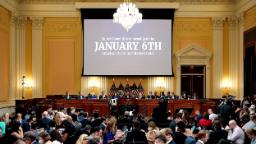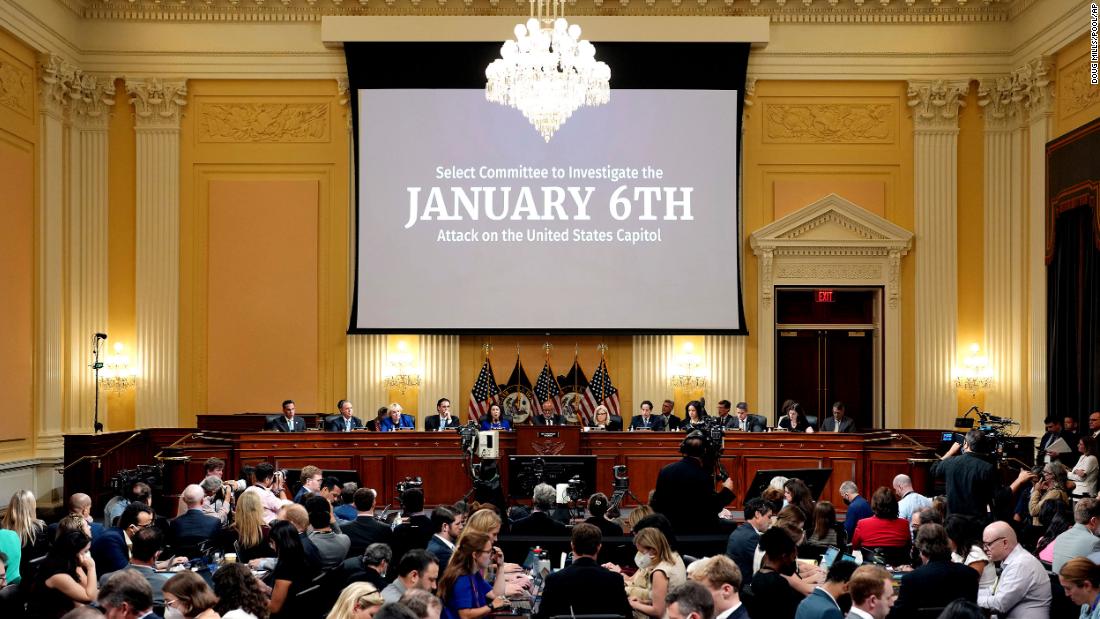
The main lesson Tuesday may ultimately be that a far-right militia, the Oath Keepers, which has been percolating for years, marched on the US Capitol believing it was doing so on behalf of the US President.
It’s hard to see how anyone paying attention could deny the facts presented — that Joe Biden won the 2020 election and that Donald Trump refused to accept this reality and tried to hold on to power.
The people working to help Trump were the kind that stored weapons and tactical gear and hung makeshift gallows at the Capitol for the then-vice president.
That’s a festering wound the past 18 months have not healed.
But the insurrection failed, right?
The bright-side view of the insurrection has always been that the democratic institutions held and Trump was unable to overturn the will of Americans through the Electoral College.
The House select committee hearings are showing how powerful the then-President made extremist groups feel.
A different vision for the US
A former Oath Keeper spokesman, Jason Van Tatenhove, testified in person before the committee on Tuesday and offered a glimpse of the group’s vision on January 6.
“It includes violence. It includes trying to get their way through lies, through deceit, through intimidation and through the perpetration of violence.”
Van Tatenhove said he worries that if Trump runs again in 2024, the former President will try to “whip up a civil war amongst his followers using lies and deceit.”
The full picture is coming into focus
Here are some of the pieces the House committee has uncovered:
- Trump nearly convinced his party to wholesale reject an election his own administration knew was valid.
- The far-right militia marched on the Capitol thinking it had the then-President’s blessing. Other rioters were bamboozled by Trump’s lies.
- It took subpoenas and months of investigation for the committee to definitively unravel what happened. Had they not been empaneled, we’d have no clear idea of the extent of Trump’s involvement.
- The witnesses who are testifying are doing so despite online threats and, according to the committee, pressure directly from Trump.
Perhaps these hearings are having an effect
Despite all of it, Trump is seriously considering officially kicking off his 2024 run for the White House.
But the current takeaway for Trump or any future president may be the wrong one — not to respect the institutions, but to further exploit their weaknesses.
We’ve identified the weaknesses. Now what?
“The crucial thing is the next step,” said Rep. Jamie Raskin, a Maryland Democrat, closing Tuesday’s hearing. “What this committee, what all of us, will do to fortify our democracy against coups, political violence and campaigns to steal elections away from the people.”
Important note: I’ll also insert the caveat here that these hearings are not like a court of law. They do not feature Trump’s side of the story since he and his allies worked hard for months to marginalize the committee.
Back to the details
At the seventh public hearing of the committee, we learned about the following:
- Trump insisted that language targeting Vice President Mike Pence be added to remarks he made to supporters on January 6 just before the insurrection.
- Trump talked on the phone to former adviser Steve Bannon the day before the insurrection and just before Bannon promised the “Stop the Steal” rally would be something unexpected.
- There’s been a clear shift in how Trump’s current allies view these hearings, combating them rather than ignoring or dismissing them, and arguing that Trump was misled by aides. Rep. Liz Cheney, the vice chair of the committee, countered this idea early in the hearing. “President Trump is a 76-year-old man,” the Wyoming Republican said. “He is not an impressionable child. Just like everyone else in our country, he is responsible for his own actions and his own choices.”
- A Capitol rioter who now regrets his actions, Stephen Ayres, provided in-person testimony and described hanging on Trump’s words and losing his house and his job as a result of his arrest after the insurrection. He encouraged others to “take the blinders off before it’s too late.”
Key points
Trump’s ‘call to arms’ tweet. The panel repeatedly highlighted a Trump tweet from December 2020, which they said was a galvanizing call-to-arms that motivated his supporters to come to Washington and disrupt the transition of power.
Cipollone interview plays a key role. (Trump White House counsel Pat) Cipollone’s testimony (clips from a video recording from his deposition last week) added a top voice to the chorus of former Trump aides who have testified to the committee they told the President there was no substantial evidence that the election was stolen from him. … (Cipollone) could play an even larger role in next week’s hearing that’s expected to focus on what was going on inside the West Wing while the Capitol attack occurred on January 6.
‘Unhinged’ Oval Office meeting. Raskin said the December 18 meeting was “critically important because President Trump got to watch up close for several hours as his White House counsel and other White House lawyers destroyed the baseless factual claims and ridiculous legal arguments offered by Sidney Powell, Mike Flynn and others.”
What else?
This story has been updated with additional information.

